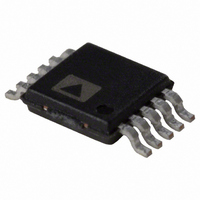AD7980BRMZ Analog Devices Inc, AD7980BRMZ Datasheet - Page 18

AD7980BRMZ
Manufacturer Part Number
AD7980BRMZ
Description
ADC 16BIT 1MSPS 1.25LSB 10-MSOP
Manufacturer
Analog Devices Inc
Series
PulSAR®r
Datasheet
1.AD7980ARMZRL7.pdf
(28 pages)
Specifications of AD7980BRMZ
Data Interface
DSP, MICROWIRE™, QSPI™, Serial, SPI™
Number Of Bits
16
Sampling Rate (per Second)
1M
Number Of Converters
1
Power Dissipation (max)
10mW
Voltage Supply Source
Single Supply
Operating Temperature
-40°C ~ 125°C
Mounting Type
Surface Mount
Package / Case
10-TFSOP (0.118", 3.00mm Width)
Resolution (bits)
16bit
Sampling Rate
1MSPS
Input Channel Type
Differential
Supply Voltage Range - Analog
2.375V To 2.625V
Supply Current
350pA
Lead Free Status / RoHS Status
Lead free / RoHS Compliant
Available stocks
Company
Part Number
Manufacturer
Quantity
Price
Company:
Part Number:
AD7980BRMZ
Manufacturer:
ADI
Quantity:
1 000
Part Number:
AD7980BRMZ
Manufacturer:
ADI/亚德诺
Quantity:
20 000
Part Number:
AD7980BRMZ-RL7
Manufacturer:
ADI/亚德诺
Quantity:
20 000
Company:
Part Number:
AD7980BRMZRL7
Manufacturer:
ADI
Quantity:
1 000
AD7980
CS MODE 3-WIRE WITH BUSY INDICATOR
This mode is usually used when a single AD7980 is connected
to an SPI-compatible digital host having an interrupt input.
The connection diagram is shown in Figure 33, and the
corresponding timing is given in Figure 34.
With SDI tied to VIO, a rising edge on CNV initiates a
conversion, selects the CS mode, and forces SDO to high
impedance. SDO is maintained in high impedance until the
completion of the conversion irrespective of the state of CNV.
Prior to the minimum conversion time, CNV can be used to
select other SPI devices, such as analog multiplexers, but CNV
must be returned low before the minimum conversion time
elapses and then held low for the maximum conversion time to
guarantee the generation of the busy signal indicator. When the
conversion is complete, SDO goes from high impedance to low.
With a pull-up on the SDO line, this transition can be used as an
interrupt signal to initiate the data reading controlled by the
digital host. The AD7980 then enters the acquisition phase and
powers down. The data bits are clocked out, MSB first, by
subsequent SCK falling edges. The data is valid on both SCK
edges. Although the rising edge can be used to capture the data,
a digital host using the SCK falling edge allows a faster reading
rate provided it has an acceptable hold time. After the optional
17th SCK falling edge or when CNV goes high, whichever is
earlier, SDO returns to high impedance.
SDI = 1
CNV
AQUISITION
SCK
SDO
CONVERSION
Figure 34. 3-Wire CS Mode with Busy Indicator Serial Interface Timing (SDI High)
t
CONV
t
CNVH
1
t
HSDO
Rev. B | Page 18 of 28
D15
2
t
CYC
AQUISITION
D14
t
3
ACQ
t
If multiple AD7980s are selected at the same time, the SDO
output pin handles this contention without damage or induced
latch-up. Meanwhile, it is recommended to keep this contention
as short as possible to limit extra power dissipation.
DSDO
t
SCKL
VIO
15
t
SCKH
SDI
Figure 33. 3-Wire CS Mode with Busy Indicator
t
SCK
AD7980
16
D1
CNV
SCK
Connection Diagram (SDI High)
17
D0
SDO
VIO
t
DIS
47kΩ
CONVERT
DATA IN
IRQ
CLK
DIGITAL HOST













